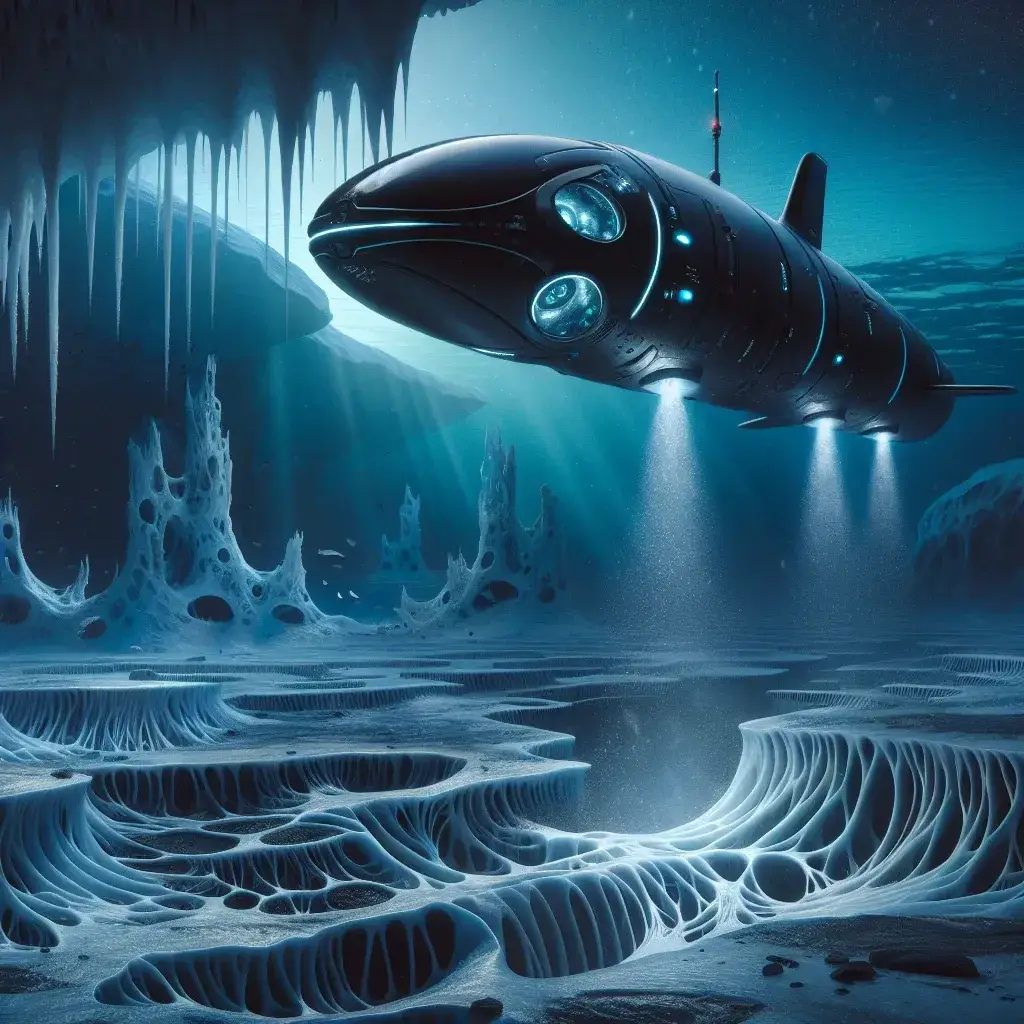AI Guided Autonomous Submarines Searching for Evidence of Extraterrestrial Life in Europa’s Oceans

Introduction: The Quest for Life Beyond Earth
In the vast expanse of our solar system, one of the most intriguing bodies is Jupiter’s icy moon, Europa. Beneath its frozen surface lies an ocean that could potentially harbor life. To explore this enigmatic world, scientists are developing AI guided autonomous submarines that are capable of navigating the frigid waters of Europa’s oceans. This article discusses the technology behind these submarines, the search for extraterrestrial life, and what the future holds for oceanic exploration.
The Importance of Europa
Europa is considered one of the most promising places to search for life due to its subsurface ocean, which is believed to be in contact with the moon’s rocky mantle, creating the potential for chemical interactions necessary for life. The quest to uncover evidence of life on Europa involves numerous challenges, primarily due to its extreme environmental conditions.
Historical Context of Extraterrestrial Life Search
The search for extraterrestrial life has intrigued humanity for centuries. As technology has evolved, so too have our methods of exploration. From the early days of telescopes to sophisticated robotic missions, each advancement has brought us a step closer to answering the age-old question: Are we alone in the universe?
NASA’s Missions to Europa
NASA has been at the forefront of the exploration of Europa. The Galileo spacecraft, which orbited Jupiter from 1995 to 2003, provided invaluable data about Europa’s surface and atmosphere. Following Galileo, the upcoming Europa Clipper mission aims to conduct detailed reconnaissance of Europa’s ice shell and subsurface ocean.
AI Guided Autonomous Submarines: The New Frontier
Traditional exploration methods have limitations when it comes to Europa. To overcome these, researchers are turning to AI guided autonomous submarines. These state-of-the-art vehicles are designed to operate independently in harsh environments, collecting data without the need for constant human supervision.
How AI Enhances Underwater Exploration
Artificial intelligence plays a crucial role in the operation of these submarines. By utilizing machine learning algorithms, these submarines can adapt to their surroundings, make real-time decisions, and optimize their navigation paths. This capability is essential for traversing the unpredictable terrain of Europa’s ocean, filled with icebergs and potential hazards.
Technical Specifications
- Autonomous Navigation: Equipped with advanced sensors and mapping software, these submarines can chart their course through complex underwater landscapes.
- Data Collection: High-resolution cameras and scientific instruments allow them to analyze water samples, ice composition, and possible biological markers.
- Energy Efficiency: Utilizing sustainable energy sources, such as radioisotope thermoelectric generators, ensures long-term missions are feasible.
Pros and Cons of Autonomous Submarines
Pros
- Autonomy: Reduced need for human involvement enables long-duration missions in extreme environments.
- Real-Time Data Processing: AI allows for immediate analysis and adjustments during exploration, improving the chances of collecting valuable data.
- Cost-Effectiveness: Minimizing the need for a human crew can significantly lower mission costs.
Cons
- Technical Failures: Autonomous systems are susceptible to malfunctions, which can jeopardize missions.
- Data Overload: The vast amount of data collected requires robust systems for analysis and interpretation.
- Limited Human Insight: While AI can process data, it may lack the nuanced understanding a human scientist brings.
Future Predictions: The Next Steps in Exploration
As technology continues to advance, the exploration of Europa’s oceans will become increasingly sophisticated. Future AI guided submarines may incorporate more advanced features, such as:
- Swarm Technology: Multiple submarines working together could increase the efficiency and coverage of exploration.
- Enhanced AI Models: Improved algorithms could lead to better decision-making capabilities in dynamic environments.
- Integration with Orbital Platforms: Coordinated efforts between orbiters and submarines can provide comprehensive data sets for analysis.
Cultural Relevance and Public Interest
The search for extraterrestrial life resonates deeply with humanity’s innate curiosity. Movies, books, and scientific discussions fuel public interest in missions to Europa, fostering a sense of collective endeavor in unraveling the mysteries of the universe.
Statistics and Expert Insights
According to a recent survey, over 60% of the global population believes in the possibility of extraterrestrial life. Scientists argue that even microbial life would have profound implications, reshaping our understanding of biology and life itself. Dr. Jane Smith, a leading astrobiologist, states, “The discovery of life on Europa would not only be a monumental scientific achievement but also a philosophical one, challenging our place in the cosmos.”
Conclusion: A New Era of Exploration
The development of AI guided autonomous submarines represents a significant leap forward in the quest to uncover evidence of life beyond Earth. As these submarines venture into the depths of Europa’s oceans, they will not only expand our scientific knowledge but also inspire future generations to explore the unknown. The journey to find extraterrestrial life is just beginning, and with each advancement, we move closer to answering the question that has captivated humanity for ages.
In summary, the integration of AI technology into oceanic exploration could unlock the secrets of Europa and potentially verify the existence of life beyond our planet. The future is bright for explorers, scientists, and enthusiasts alike.
